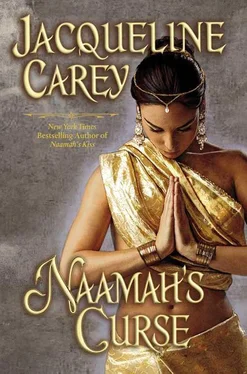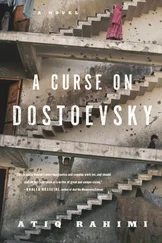His wife didn’t wait for my reply. Grasping the fur-trimmed cuff of my sleeve, she tugged me firmly toward the encampment. Wrapped in a warm blanket and their generosity, I went willingly.
There were some two dozen of the felt huts, which I later learned to call gers , in the camp. At close range, they were much larger and more substantial than I had reckoned, and infinitely more sophisticated than the simple tent that the storm had snatched away from me, thick felt layered on dome-shaped lattices. All the gers faced south, with brightly painted wooden doors. Smoke drifted from a hole at the top of each dome.
My hostess led me to the ger with the most elaborately painted doorway, ushering me inside.
Warmth struck me-warmth, and the smell of the rich, salty tea she had brought me. There were thick woolen carpets woven with intricate designs covering the floor of the ger , keeping the cold of the frozen ground at bay. Overhead, the poles of the lattice framework radiated like the spokes of a great wagon-wheel. Beneath the smoke-hole, two pots simmered atop an iron stove. I inhaled deeply, letting the blanket slide from my shoulders. My hostess smiled and took the empty bowl from my hand, then said somewhat in a formal tone.
I bowed in response. Even if she couldn’t understand my words, it seemed important to speak them aloud. “May all the gods bless you for your hospitality and generosity, my lady.”
“Eh?” On the far side of the ger , a seated figure lifted a wizened face, cupping one ear. Her bright eyes squinted in a parchment map of wrinkled skin. With an effort, the oldest woman I’d ever seen in my life, older than Old Nemed of the Maghuin Dhonn, dragged herself to her feet and hobbled across the carpets.
My hostess offered her what sounded like a bemused explanation.
The old woman nodded absently, peering at me. She had to crane her neck since a hump atop her spine wouldn’t allow her to stand entirely straight. Licking her weathered lips, she essayed a question, starting and stopping several times, pausing to search her memory. At last she got it out, each syllable rusted and creaky. “Did I hear you speak the scholar’s tongue of Shuntian?”
I blinked in surprise. “Yes, Grandmother.”
“Thought so.” She poked me in the breast-bone with one gnarled finger, her eyes sharp and inquisitive. “Who are you? What are you? And why in the world are you here ?”
My hostess glanced back and forth between us, perplexity on her kind face. A boy toddler wobbled over to clutch at her coat; another child, a young girl, sidled up behind her, peeking out at me.
“I am Moirin,” I said politely. “Moirin mac Fainche of the Maghuin Dhonn. And as to what that means and why I am here, I fear it is a very long story.”
“Oh, good.” The old woman doubled over and coughed deep in her chest, then straightened to the best of her abilities, dark eyes glinting at me in her wrinkled face. She yawned widely, covering her mouth to hide it. “And after I’ve finished my morning nap, you can tell it to me.” She turned to hobble away, offering one last comment over her shoulder. “And take your time about it, because it’s going to be a long winter.”

So it came to pass that I wintered amongst a Tatar tribe.
It wasn’t my intention to stay with them, but from the beginning, it was obvious that the weather gave me little choice. Once winter arrived in earnest, even the hardy, nomadic Tatars with all their knowledge of surviving on the plains settled in for the duration.
On that first morning, I sat cross-legged on the carpeted floor of the ger , feeling awkward at my unintentional imposition, trying to stay out of the way while I waited for the old woman to finish her nap. My pregnant hostess brought me a bowl of hot, stewed meat to eat. I accepted it gratefully. When I had finished, the little girl-her daughter, I guessed-approached me shyly at her mother’s urging. With gestures, she showed me I was meant to wipe the bowl clean with my fingers, gathering the last of the juices. She bobbed her head in cautious approval when I obeyed.
The boy tending to my horses entered the ger along with a blast of cold air, staggering under the weight of my packs and gear. He darted back out before I could even thank him.
My hostess bustled around, scouring dishes and stirring pots. When I offered with gestures to assist her, she smiled and shook her head. She pointed across the ger to the pallet where the old woman was now snoring deeply, made a circling gesture with one finger that indicated time passing, then mimed two mouths talking with both hands.
“I understand,” I said. “We will speak when she awakes. I only wanted to help in the meantime.”
She pointed firmly at the carpeted floor and said something in a stern tone. Although she couldn’t have been more than ten or twelve years older than me, it sounded for all the world like a mother’s reprimand.
I sat, chastened.
My hostess smiled and went about her business.
Lulled by the warmth of the ger and the hot stew in my belly, I felt the weight of my exhaustion settle over me. Although I’d no intention of falling asleep amongst these strangers, hospitable though they seemed, my head grew heavy, my chin sinking to my chest. I fell into a light doze.
I awoke to find the family gathering around a low table for a mid-day meal of more stewed meat.
The old woman glanced over and gave a creaking laugh. “Aha! The slumbering forest spirit is awake.” She beckoned to me. “Come, come, eat,” she said, adding something in the Tatar tongue.
My hostess rose with ungainly grace to fill another bowl for me.
“Thank you.” I accepted it with a bow, then took a seat at the table at her insistent gesture. “You’re very kind. Grandmother, will you thank her for me?”
“She knows.” The old woman’s mouth worked as she chewed. “You’ve been bobbing up and down like a courtier since you came through the door. So! Begin your story, will you?”
I paused, the spoon halfway to my mouth.
My hostess spoke gently to the old woman, who sighed. “Oh, fine! My granddaughter says eat first, talk later.”
They waited patiently for me to finish. There were six of them present: my hostess and her husband; the young herdsman, who I guessed to be around thirteen and their eldest son. The little girl’s age I put at six or seven, and the toddler at two or three; and of course, there was the old woman, whose age I couldn’t begin to guess. All of them gazed at me with polite curiosity while I ate.
After I had finished and wiped my bowl with my fingers in the prescribed manner, my host addressed me in a formal tone.
“My grandson Batu welcomes you into his dwelling,” the old woman translated. “He hopes you find it a place of peace.”
“Batu.” I echoed his name. “Yes, thank you.”
“Good.” The old woman took a noisy slurp of tea, fixing me with her sharp gaze. “Now tell me who in the name of the ancestors you might be, and what in the name of all the gods and the great blue sky you’re doing here.”
I did my best.
It wasn’t easy. There was far, far too much to explain, and I didn’t know how much of my tale might give offense. The Tatars and the Ch’in existed in an uneasy truce in the best of times, and I did not care to reveal myself as an Imperial favorite. So I simply told her that I had come from faraway Terre d’Ange, travelling to Ch’in to continue studying with my mentor, the venerable sage Master Lo Feng. That I had fallen in love with a fellow student, who had fled after our mentor’s death, venturing into Tatar territory to seek his father; and that I had set out in pursuit of him, driven by love.
Читать дальше











